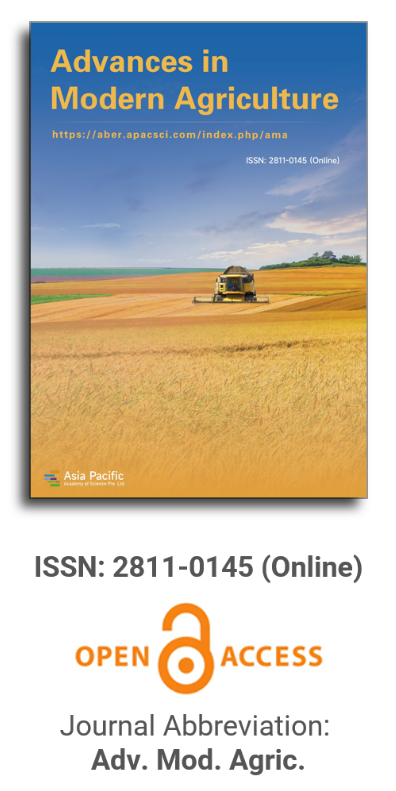


Characteristics, diagnosis and analysis of some indicators in the agricultural sector of the Trinidad Municipality, Cuba
Vol 5, Issue 3, 2024
VIEWS - 3245 (Abstract)
Download PDF
Abstract
In the new policy established by the Cuban state for the agricultural sector, the achievement of food sovereignty and sustainability of said sector is established as a basic principle, which was endorsed in the current Law of Food Sovereignty and Food and Nutritional Security. For this reason, each municipality in the country, and under certain levels of autonomy, must guarantee compliance with the aforementioned law. For this, strict control of the structures of the territorial agricultural system and the behavior of its structures is necessary. With the completion of this work, the characterization, diagnosis and evaluation of some sustainability indicators for the agricultural sector in the Trinidad Municipality were established as objectives, in the period between 2015 and 2020, for this a work team was created that was able to collect, organize, analyze, compare and evaluate the information that appeared in the National Office of Statistics and Information of the Republic of Cuba, between the years 2015 and 2020, finding as one of the results that the workforce indicator used in this sector has suffered a drastic decrease, not guaranteeing the man-area relationship necessary to achieve food sovereignty and the sustainability of the sector at a territorial level.
Keywords
References
- Socorro AR, Ojeda R. Agrarian management: A multidimensional analysis of its sustainability. In: monograph CETAS. University of Cienfuegos; 2003.
- Altieri M, Nicholls C. Agroecology, theory and practice for sustainable agriculture. United Nations Environment Programme, Mexico; 2000.
- Santana T, Castellanos L. Evaluation of agrarian and rural development with sustainability criteria in the community of Mantecal, Apure State, Venezuela. Agroecosistemas Magazine (Carlos Rafael Rodríguez University of Cienfuegos, Cuba). 2013; 1(1): 22-33.
- Altieri M. Agroecology. Scientific bases for sustainable agriculture. Chile. The Latin American Consortium on Agroecology and Development; 1997.
- Beemans P. Humanity Development Library: Culture, spirituality, and economic development. IDRC; 1997.
- Álvarez E, Castellanos L, Soto R. Sustainability indicators in five agroecological farms with different management conditions, in the territory of Trinidad, Cuba. Centro Agrícola Journal. 2012; 39(3): 91-92.
- Socorro AR, Padrón WR, Parets ER, Pretel R. Alternative Model for Agricultural Rationality. Special Edition for the Universalization of Higher Education. Editorial Universo Sur. University of Cienfuegos; 2004.
- Fernández V. Analysis of the economic and financial feasibility of import substitution in bean production in the municipality of Manicaragua. Universidad Central de las Villas; 2013.
- Cardoso R, Torres CC, Menoya S. Planning of the agricultural sector as the axis of the provincial development strategy in Pinar del Río. Journal of Cooperativism and Development. 2016; 1.
- López G, Turiño T. Local Development Strategy of the Trinidad Municipality. Trinidad People’s Power Assembly, Sancti Spiritus Province, Cuba; 2023.
- ONEI. National Office of Statistics and Information. Statistical Yearbook of the Trinidad Municipality 2022. CHAPTER 1: Territory.
- Valdés D, Pujol ID, Ramírez R, et al. Legal Status Until 2016 of the Land Fund, Labor, Salary and Performance in the Agricultural Sector of the Trinidad Municipality. International Journal of Science, Technology and Society. 2023; 11(1): 11-16. doi: 10.11648/j.ijsts.20231101.120
- Maqueiras L. Evaluation of sustainability levels in farms of the UBPC “Emilio Hernández Cruz” of the Artemisa municipality, through the use of the MESMI method. Ecovida Magazine. 2021; 11(3).
- Montesinos D. Characterization of the “La Asunción” Farm through indicators for sustainability. Agrarian University of Havana “Fructuoso Rodríguez Pérez”; 2009.
- ONEI. Chapter 1: Territory. In: Statistical Yearbook of the Trinidad Municipality 2022. National Office of Statistics and Information; 2020.
- Valdes D, Suárez C. Strategic model for the 13 de Marzo Agricultural Production Cooperative, in Trinidad, Cuba. Agroecosystem Magazine. 2018; 6(1).
- Stoner J. Administration, 5th ed. Havana: MES; 2002.
- González A. Redesign and implementation of the Management Strategy of the Siguaney Basic Cooperative Production Unit. Thesis as an option for the Academic Degree of Master in Management, Study Center for Advanced Management Techniques. Sancti Spíritus: University of Sancti Spíritus José Martí Pérez; 2007.
Supporting Agencies
Copyright (c) 2024 Delvis Valdés Zayas, Mario Enrique Sánchez Morales
License URL: https://creativecommons.org/licenses/by/4.0/

This site is licensed under a Creative Commons Attribution 4.0 International License (CC BY 4.0).

Prof. Zhengjun Qiu
Zhejiang University, China

Cheng Sun
Academician of World Academy of Productivity Science; Executive Chairman, World Confederation of Productivity Science China Chapter, China
Indexing & Archiving
In the realm of modern agriculture, the integration of cutting-edge technologies is revolutionizing the way we approach sustainable farming practices. A recent study published in Advances in Modern Agriculture titled "Classification of cotton water stress using convolutional neural networks and UAV-based RGB imagery" has garnered significant attention for its innovative approach to precision irrigation management. Conducted by researchers from Institute of Data Science and the AgriLife Research and Extension Center of Texas A&M University (authors's information is below). This study introduces a novel method for classifying cotton water stress using unmanned aerial vehicles (UAVs) and convolutional neural networks (CNNs), offering a powerful solution for optimizing water use in agriculture.
Modern agricultural technology is evolving rapidly, with scientists collaborating with leading agricultural enterprises to develop intelligent management practices. These practices utilize advanced systems that provide tailored fertilization and treatment options for large-scale land management.
This journal values human initiative and intelligence, and the employment of AI technologies to write papers that replace the human mind is expressly prohibited. When there is a suspicious submission that uses AI tools to quickly piece together and generate research results, the editorial board of the journal will reject the article, and all journals under the publisher's umbrella will prohibit all authors from submitting their articles.
Readers and authors are asked to exercise caution and strictly adhere to the journal's policy regarding the usage of Artificial Intelligence Generated Content (AIGC) tools.
Asia Pacific Academy of Science Pte. Ltd. (APACSCI) specializes in international journal publishing. APACSCI adopts the open access publishing model and provides an important communication bridge for academic groups whose interest fields include engineering, technology, medicine, computer, mathematics, agriculture and forestry, and environment.



.jpg)
.jpg)

.jpg)
